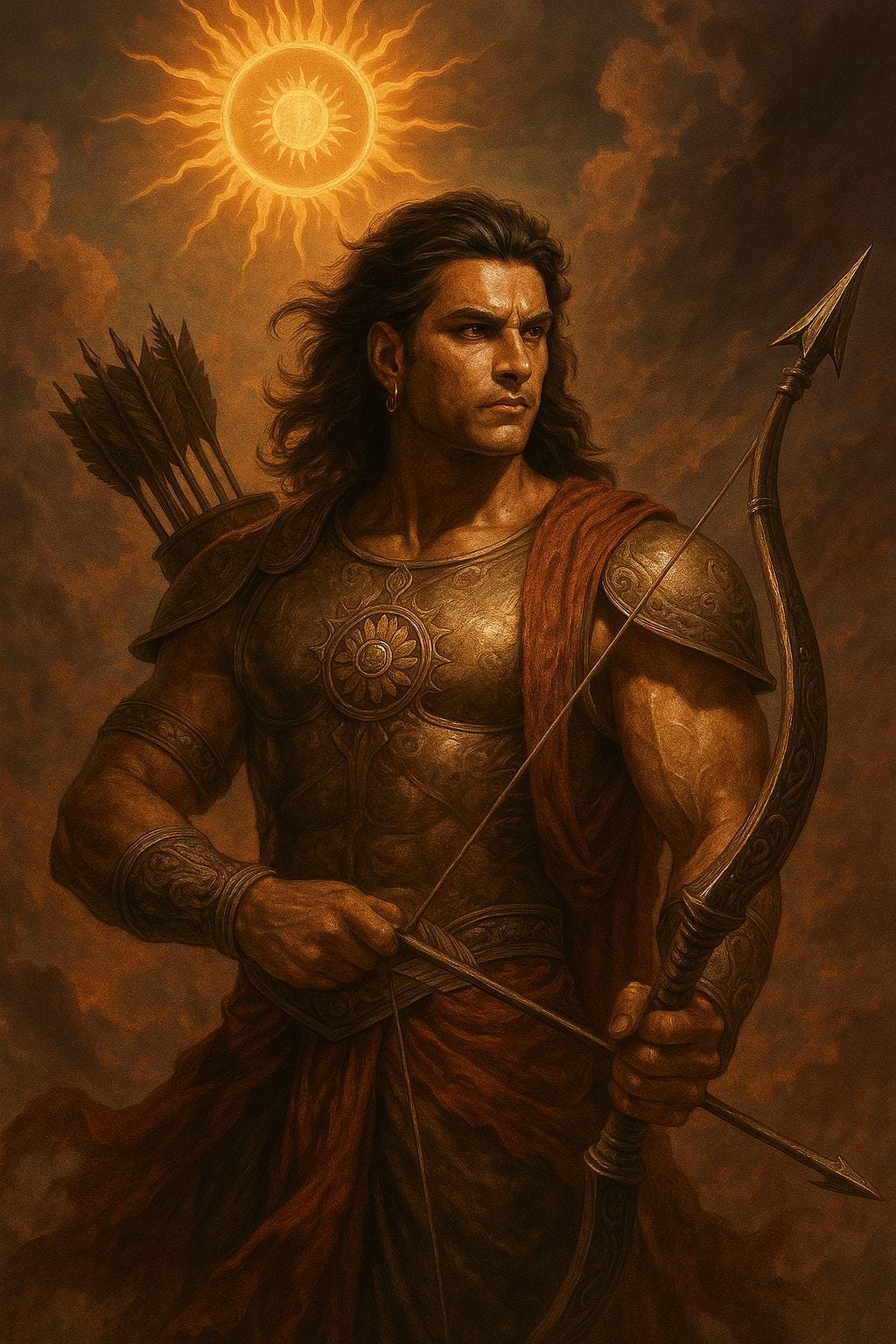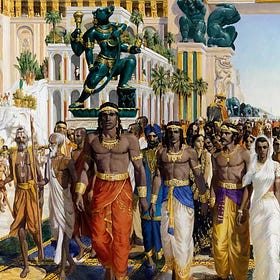Injustice? The truth behind the stories of Karna and Ekalavya.
Many read the Mahabharata and feel sympathy for Karna and Ekalavya. Both indeed possessed pious qualities. However, when we examine from proper sources, we come to know the deeper truth.
Many read the Mahabharata and feel sympathy for Karna and Ekalavya. Both indeed possessed pious qualities. Karna was very charitable, while Ekalavya displayed extraordinary determination. Both were highly skilled archers, and in this sense, they inspire admiration. Yet, as the saying goes, “the good is often the enemy of the best.” When we approach the Mahābhārata through proper sources, we come to see the deeper truth behind their stories.
Ekalavya was very determined, but he lacked other good qualities. For this reason, Dronacarya refused to teach him the military science, since martial skills in the hands of someone of questionable character can be extraordinarily dangerous. We can see this in the example of Aśvatthāmā, who almost destroyed the entire world by unleashing a brahmastra without knowing how to retract the weapon.
After being rejected, Ekalavya showed his real face by trying to steal the military art from Dronacarya by worshiping a statue of him. Arjuna was the first to notice what was happening and was quick to alert the guru of the fact. Drona thus decided to punish him by taking his thumb, thus nullifying the skills he obtained by this illicit process.
Karna also exhibited a number of good qualities. He was a pious and charitable person. Thoroughly much of the Mahabharata, he was following the principles of dharma. Still, he had quite a difficult life. Draupadi rejected him at the swayamvara ceremony, and Krsna took the side of Arjuna against Him.
At first, it may seem like an injustice, but a more careful analysis shows that although Karna was a pious person, he had a great flaw: He was not a devotee. This fact was actually the reason for his difficult life. Material piety is good, but it is not sufficient for one to attain ultimate success in life. One who is just materially pious is still under the effects of his karma and vulnerable to the effects of lust, anger, and other qualities.
Krsna intervenes in the life of His devotees, just like he intervened in different situations, whenever the Pandavas were in danger, but he does not intervene in the lives of persons who are just materially pious as long as they don't approach Him. If the situation arises, He may favor His devotee over a pious person, just like He favored Arjuna over Karna.
Srila Prabhupada explains that a father will maintain all his children, but he will always have special care for the children who are affectionate towards him and cooperate with him. He may show his concern for a child who is acting properly by patting him and giving him presents, and may show his care for a child who is not acting properly by chastising him. Superficially, it may seem that the father loves the well-behaved child and hates the other, but careful observation shows that he is showing care for both. To pet and give presents to a child who is not behaving properly will just reinforce his bad behavior; therefore, the father acts properly when he chastises him, hoping to bring him back to his good sense.
Similarly, in the story of the Mahabharata, the Pandavas play the role of the good children, who are always cooperating with Krsna and acting affectionately towards Him. They are the pure devotees who are assisting the Lord in His mission. They are eternally connected with Krsna by the bond of love and are acting upon their true nature as pure souls. Karna, on the other hand, played the role of the lost child. Although he may have good qualities, he was acting inimically to the Pandavas and other pure devotees, taking the side of Duryodhana due to his vanity, and therefore Krsna has to punish him to bring him back to his good consciousness. Although following the path of mundane piety, Karna failed to attain real piety, realizing his eternal nature as a pure soul. Instead, he was acting on a selfish platform, trying to realize his own ambitions, a process that resulted in the numerous blunders he committed in life under the influence of lust and anger.
We can see that towards the end of the war, Kunti revealed the whole story to Karna and proposed that he would take care of Yudhisthira, becoming the oldest Pandava and thus becoming the king. However, he could not accept it due to his pride. It is not that Karna was not favored by Krsna, and as a result became envious. He was envious from the start, and thus he failed to attain the favor of Krsna.
Of course, due to the presence of Krsna, the death of Karna was glorious, since he attained liberation, just like all the other warriors who died in the battle of Kuruksetra, but others who would follow similar steps today would not attain such a good result. Therefore, Krsna was attentive in the Mahabharata to give him an apparently bad result, so others may understand and thus find the proper path to follow.
Most of us are quite degraded nowadays, and from this platform, the platform of piety that Karna was acting on seems to be quite high, but one who is truly advanced in the spiritual path can clearly see his blunders. This is the same reason other great personalities, like Bhismadeva, also did not appreciate his actions very much, criticizing and dismissing him on numerous occasions.
Another lesson we can learn from all of this is the importance of hearing from the proper sources. Most books, movies, and other works based on the Mahabharata are done by persons who are not pure devotees of Krsna, and thus can't properly explain the nature of Krsna and His pure devotees. They are confused themselves and thus depict the story in a way that makes everyone else confused. Arjuna thus became the villain, Karna, and Ekalavya the heroes, and Krsna just a historical personality on the sidelines.
If one wants to truly understand Krsna, he needs to listen about Him from self-realized souls who know Him. One who hears from a layman is sure to misunderstand.
Read also:
Is it true that the Pandavas and Lord Rama ate meat?
One question many may have after studying different translations of the Mahabharata and Ramayana are passages that say that the Pandavas and even Lord Rama ate meat. We are very strongly prohibited from eating meat, and animal killing for the satisfaction of the human palate is considered extremely sinful, so how is it possible that the Pandavas, who are role models for us, were eating meat? What about Lord Rama, who is God himself?




Injustice was done to Fighter warrior Abhimanyu and Arjuna in the battlefield of Kurukshetra on the part of Kauravas which most general population are unaware of ;
'
the kshatriya code that a chariot-less warrior should not be attacked was violated first by the Kauravas’ side. On the thirteenth day, six of their maha-rathas including Karna ganged together to kill the chariot-less Abhimanyu. So, Karna simply reaped what he had sown – he violated the code first by attacking the chariot-less Abhimanyu and was paid back in kind, as had been agreed at the start of the war.
Karna broke Abhimanyu's bow from behind since it was impossible to face armed Abhimanyu. Kripa killed his two chariot-drivers, and Kritavarma killed his horses; Abhimanyu took up a sword and a shield but these weapons were cut off by Drona and Ashwatthama.'
And the unfair attack on Abhimanyu was not a one-off incident on the part of the Kauravas. .
Karna himself violated that specific code on the seventeenth day during his confrontation with Arjuna. When Karna sent an unstoppable mystical weapon at Arjuna’s head, Krishna forcefully pushed the chariot into the ground so that the arrow hit Arjuna’s crown instead of his head. Arjuna’s life was saved, but his chariot got stuck in the ground. While Krishna jumped off the chariot to get it out of the ground, Arjuna was disadvantaged with an immobile chariot. Karna still attacked him and Arjuna didn’t ask to be spared, but fought back and defended himself.
https://iskcondesiretree.com/profiles/blogs/setting-the-record-straight-about-mahabharata-s-karna